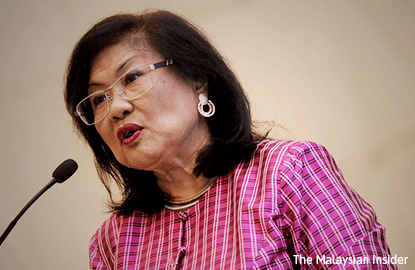
KUALA LUMPUR (Feb 4): Umno veteran Tan Sri Rafidah Aziz said her party's political putsch to replace the Kedah menteri besar was a reflection of current political culture of "toppling one another".
The former Wanita Umno chief asked if "toppling others to grab whatever position being eyed" had become the norm after Datuk Seri Mukhriz Mahathir Mahathir was ousted by Kedah Umno leaders.
She said such a culture had divided people rather than promoting unity and common good.
"Some people seem to be subscribing to... a political culture of self interest.
"Of toppling others to grab whatever position being eyed. Greed for power and to hold on to power... It is about what can only be regarded as greed, in every sense of the word," Rafidah posted on her Facebook last night.
"Must toppling one another be the norm?"
Her post followed Mukhriz's decision to step down after losing the support of Kedah assemblymen.
Mukhriz faced an internal revolt led by Kedah Umno deputy liaison chief Datuk Seri Ahmad Bashah Md Hanipah, who was sworn in as the new menteri besar this morning.
Following his resignation, Mukhriz, the youngest son of Tun Dr Mahathir Mohamad, attributed his removal to his outspokenness on issues implicating the Umno president and Prime Minister Datuk Seri Najib Razak, such as allegations surrounding 1Malaysia Development Bhd (1MDB) and the RM2.6 billion in his accounts.
Rafidah, who was the international trade and industry minister during Dr Mahathir's time, said positions were meaningless if they did not benefit the people.
"Don't people understand that 'leadership' does not have anything to do with posts, positions and designations? That it has to do with the qualities of the individuals themselves?
"The qualities that have to do with how they actually lead, perform, decide, govern and elicit respect; that others strive to emulate and make others look up to them?
"Leaders are not 'made' simply because someone drags another person down from a position," she said.
She questioned why rivals could not work as a team by complementing each other's strengths to achieve common objectives in public service and for the good of the people.